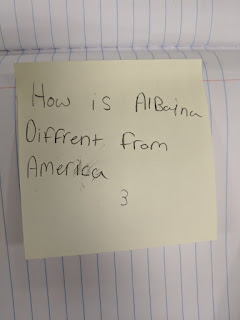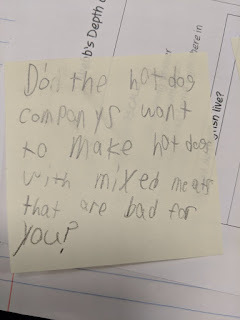My job in this unit was to act more as a facilitator of learning and guide their research when needed. One thing that I noticed in this process was that the kids were pulling out surface level information and answering very basic questions about their topic. For example, some kids chose to investigate endangered animals. They started by listing animals that are endangered and taking notes on where these animals live. I knew I needed to do something to lift the level of learning for these kids, so we looked at Webb's Depth of Knowledge Questions!
As a teacher, I am cognizant of the types of questions I ask kids in every lesson, but they have never been exposed to the different levels of questioning that should take place in their minds during reading! This lesson was POWERFUL for so many reasons. The kids immediately realized that the research they had gathered was very basic and quickly developed a desire to push themselves to ask better questions, which would lead them to more meaningful research.
Those same kids that are researching endangered animals, shifted their thinking and began asking questions like this:
Here are more examples of the questions the students developed after being exposed to the levels of questioning:

After developing these questions, the students returned to their research in hopes of finding answers. Some kids had to turn to different sources that gave a different perspective on their controversial topic. For example, the boy studying how hot dogs are made found a website created by the makers of hot dogs. The information he found there was contradicting the information found in his text about disgusting foods. In order to answer some of his higher level thinking questions, he had to analyze and synthesize across texts to develop his own theory and understanding of hot dogs.
The students are motivated not only by the freedom of choice in this unit, but the amount of ownership they are given over their learning. This year I have let go of a lot of control and given the students the tools and strategies to make themselves want to be better readers!




No comments:
Post a Comment